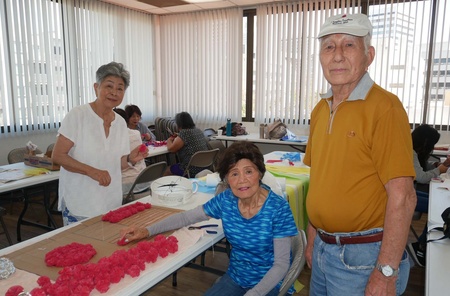Wants to continue but problem is lack of manpower
The Tanabata decorations of the Los Angeles Tanabata Festival have been delighting visitors to Little Tokyo at the Nisei Week Festival, the largest festival for the Japanese community in Los Angeles, held every August, since 2009. The large decorations, sent from Sendai, the original site, are reminiscent of summer festivals in Japan, the country of origin for the Japanese community.
I first covered the Tanabata Festival in Los Angeles in 2010, the second year of the festival. I still fondly remember the scene of Narumi Koichiro, the sixth generation owner of Narumi-ya Paper Trading in Sendai, and Yamamura Ranko, a member of the company's Tanabata Planning Department, who rushed to Los Angeles ahead of the festival and enthusiastically instructed volunteers from the local Japanese community on how to make Tanabata decorations. At the time, Yonezawa Yoshito, who was the chairman of the Miyagi Prefecture Association at the time, was working with his colleagues to create decorations in order to present the Tanabata Festival of his hometown, Miyagi Prefecture, to the people of Los Angeles.
Now, 13 years later, in July of this year, Yonezawa was holding a workshop at the Pioneer Center within the Japan America Cultural and Community Center to create decorations featuring the Japanese and American flags to be exhibited from Los Angeles at the Tanabata Festival one month later.

"Thanks to everyone in the community, we've been able to continue the Tanabata Festival in Los Angeles until now. Even during the COVID-19 pandemic, we received large decorations from Japan which we put up in front of the Cultural Center, and we were also asked by NBC (Channel 4) in New York to send decorations to introduce Japanese culture in conjunction with the Tokyo Olympics. In fact, we've received many requests to put up Tanabata decorations from areas other than Little Tokyo, where Nisei Week takes place. But since it started in Japantown (Little Tokyo), we plan to continue holding it here for now."
One of the reasons why it is difficult to hold the event in multiple locations is a lack of manpower.
"Before the festival, we hold workshops and have volunteers make the decorations to be sent from Los Angeles (in addition to the decorations sent from Sendai), but since the COVID-19 outbreak, the number of volunteers willing to help has decreased. Last year, I handed over my position as president of the Miyagi Prefectural Association, a position I had held for 30 years, to someone else. However, as of now, we have not yet found someone to take over for the Tanabata Festival. I am already 93 years old. Last year, I told the Nisei Week Festival that I could no longer do it this year, but they persuaded me to stay. As a result, I have continued to serve as (executive chairman) this year, as I did last year."
The emotion conveyed beyond race
At first, Yonezawa thought it would be helpful if someone from Miyagi Prefecture could take over the Tanabata Festival in Los Angeles, but now he says he would be happy to hand it over to anyone, regardless of their background, who has the passion to take responsibility and see the festival continue in the future.
"The people of Japan (in Sendai) are also worried about whether the Tanabata Festival in Los Angeles can continue in the future. In fact, when I visited Japan after the COVID-19 pandemic ended, I met Yamamura (mentioned above), and she was already 91 years old. She told me, 'I would like to go to Los Angeles to see the Tanabata Festival, but I no longer have the physical strength to do so.' When Yamamura saw me at 93 years old, she said to me, 'You look fine,' but the truth is that I'm not so well anymore. If there is someone who is willing to take over in my footsteps, I would like to contact Japan and let them know that I have found them."
When asked what the most rewarding part of his involvement with the Tanabata Festival in Los Angeles since 2009 was, Yonezawa replied:
"When I saw how happy the people who looked at the decorations were, I felt that it was truly rewarding. What's more, I was happy that people of various races, not just Japanese or Japanese-Americans, were moved by the decorations. In addition to just looking, past workshops have also seen the participation of Hispanic, African-American and other people of various races."
Even after a new leader is found, Yonezawa says he has no intention of retiring completely, and wants to continue to support the group in any way he can. "As an advisor? No, no, I don't need that kind of title at all. I definitely want to help out."
This year's Tanabata Festival will start on August 11, but decorations will start on August 8, so Yonezawa will be in charge of overseeing the festival. In addition to the decorations sent from Sendai, the festival itself, decorations from Los Angeles-based organizations such as the Pioneer Center, the North American Okinawan Association, NALC, and the Society for Ethics Research are scheduled to be on display.
* * * * *
15th Los Angeles Tanabata Festival
August 11th - 20th, 2023
(Held in and around the Japanese American National Museum in Little Tokyo)
reference
Previous Discover Nikkei interviews with Yonezawa:
" Kizuna: Nikkei Story ~From the Great East Japan Earthquake~ Three Years Since the Great East Japan Earthquake: Interview with Yoshito Yonezawa, President of the Southern California Miyagi Prefecture Association " Part 1 & 2 (March 3rd & 10th, 2014)
Previous articles about the Tanabata Festival in Los Angeles:
" People from Sendai come to Rafu to participate in Tanabata decoration workshop " (June 3, 2010)
© 2023 Keiko Fukuda





